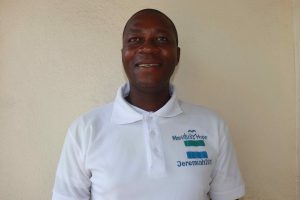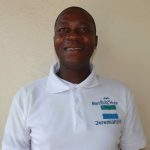The 125 people living in The Rosarian Community labor tirelessly to collect water daily to meet their needs, especially during the dry season.
There is an unprotected dug well in the community. To collect water from the well, community members must lower a bucket on a rope and pull it back up once it is full. It is a tedious, time-consuming task, especially when the well is overcrowded. Worst of all, the water they spend so much time collecting is contaminated and experiences seasonal dryness.

When the well is dry, people resort to collecting water from the alternate water source, the local river. Sadly, it is far away, wasting people's valuable time, and the water collected there is also contaminated, leaving people suffering from water-related illnesses unnecessarily.

"Drinking from these water sources causes me to contract water sicknesses, and whenever [that happens, I] visit the health center at Katongha, which is three miles away from the community. The nurse told me I needed to purify the water that I use. This will not be possible because I do not have medicine to purify the water, and I do not like drinking boiled water. As a result, my health is always under attack," said 45-year-old farmer Ya Umu Sesay (shown below).

"I must wake up by 6 a.m. to help [my] mother fetch water before going to school at 7 a.m. If I could not get water from the main water source, it would take me an hour to walk to the alternate source to fetch water. The water challenges often cause me to go to school late because I must walk more than two miles to access the school I am attending. Also, there is not enough time to play and read my lesson notes. There are times my mother could prepare food extremely late at night because of the water challenges. This affects my stomach after eating late at night because the food would not digest properly before going to bed, and I could have sleepless nights," said 15-year-old Mohamed K. (shown below).

The lack of water is impacting the entire Rosarian community negatively. Adults cannot grow crops needed to feed their families and make a livelihood, and students are missing necessary learning time at school, which will impact their futures.
Rehabilitating the well, converting it by drilling it much deeper, and installing a new pad that is safer for the community to use will help provide relief from the water crisis. The people of Rosarian will have access to plenty of clean water closer to their homes whenever needed, so they have time for their other important daily tasks. Students will no longer have to sacrifice their education to collect water, which is likely to make them ill.
"I pray that this project will solve the water challenges in our community," said Mohamed.
"I believe all our water constraints will be over once we have a new water point," Ya Umu concluded.
The Proposed Solution, Determined Together...
At The Water Project, everyone has a part in conversations and solutions. We operate in transparency, believing it benefits everyone. We expect reliability from one another as well as our water solutions. Everyone involved makes this possible through hard work and dedication.
In a joint discovery process, community members determine their most advantageous water solution alongside our technical experts. Read more specifics about this solution on the What We're Building tab of this project page. Then, community members lend their support by collecting needed construction materials (sometimes for months ahead of time!), providing labor alongside our artisans, sheltering and feeding the builders, and supplying additional resources.
Water Access for Everyone
This water project is one piece in a large puzzle. In Kenya, Sierra Leone, and Uganda, we're working toward complete coverage of reliable, maintained water sources that guarantee public access now and in the future within a 30-minute round trip for each community, household, school, and health center. One day, we hope to report that this has been achieved!
Training on Health, Hygiene & More
With the community's input, we've identified topics where training will increase positive health outcomes at personal, household, and community levels. We'll coordinate with them to find the best training date. Some examples of what we train communities on are:
- Improved hygiene, health, and sanitation habits
- Safe water handling, storage & treatment
- Disease prevention and proper handwashing
- Income-generation
- Community leadership, governance, & election of a water committee
- Operation and maintenance of the water point




 Borehole Well and Hand Pump
Borehole Well and Hand Pump
































